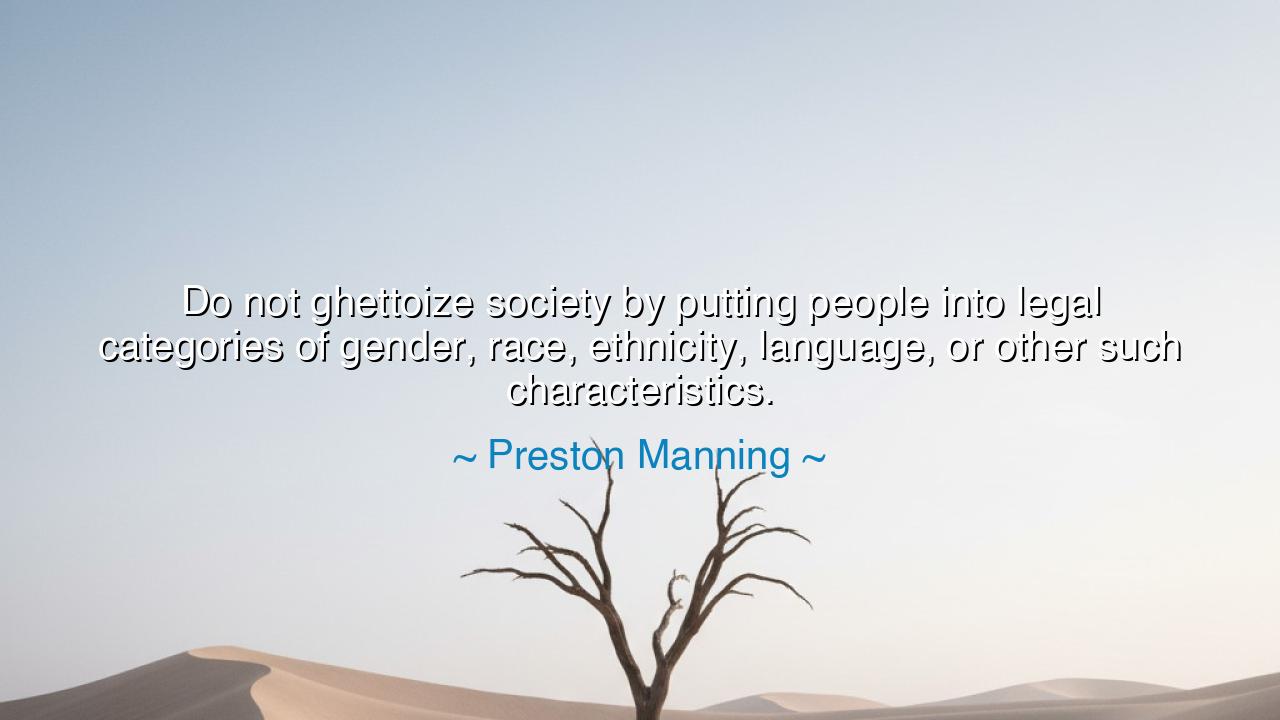
Do not ghettoize society by putting people into legal categories
Do not ghettoize society by putting people into legal categories of gender, race, ethnicity, language, or other such characteristics.






In the great expanse of human history, we have always sought to define ourselves—by our lands, our families, our tribes, and our customs. But in doing so, we have often forgotten the most fundamental truth of our existence: we are all human beings, bound together by the same desires, the same dreams, and the same needs. In the wise words of Preston Manning, “Do not ghettoize society by putting people into legal categories of gender, race, ethnicity, language, or other such characteristics.” These words, like a cry from the soul, call us to transcend the divisions that separate us and to look upon each person not through the lens of difference, but through the lens of unity.
To ghettoize is to confine—to limit, to diminish, and to separate. It is to take the vast mosaic of humanity and break it into fragments, each fragment defined not by its shared humanity, but by its differences. Manning's warning is powerful because it speaks to the dangers of dividing society into legal categories that reduce the richness of human experience to mere labels. When we place people into boxes—whether by gender, race, ethnicity, or language—we lose sight of the truth that lies at the core of all human beings: our shared humanity. It is in this division that we foster discord, suspicion, and inequality.
Consider the great civilizations of the past, when societies were built on the idea of unity and collective progress. The Romans, though diverse in culture and language, understood the importance of seeing themselves as a single entity—the Roman Empire. They recognized that their strength lay in their ability to unite many peoples under one banner, transcending the barriers of ethnicity and culture. It was this unity that allowed them to build great roads, to create lasting works of architecture, and to develop a legal system that became the foundation of many modern nations. The Roman principle was simple: strength lies in unity. Dividing their empire by race, language, or ethnicity would have torn apart their very foundation.
Similarly, in ancient Greece, despite the differences between city-states like Athens and Sparta, the Hellenic people understood the importance of collaboration. The Greeks came together in times of need, setting aside their differences to form powerful alliances like the Delian League, which allowed them to defend against common enemies. It was in these moments of shared purpose that they rose to greatness, transcending the limitations of individual identity in favor of a collective vision. The Greeks, in their wisdom, understood that human strength does not lie in isolating each group based on characteristics but in uniting all people in the pursuit of greater ideals.
In more recent history, the struggle against apartheid in South Africa is a glaring example of what happens when society is ghettoized by race. The laws of apartheid divided South Africans into legal categories based on their racial backgrounds, restricting their rights and freedoms accordingly. The effects were devastating, not only for those who were oppressed but for the nation as a whole, which suffered from the loss of potential and the tearing apart of its social fabric. The fight for equality—led by figures like Nelson Mandela—was a struggle to overcome these divisions and to build a society where the value of each individual was not determined by their skin color or ethnicity, but by their character and contribution to the whole.
The true lesson here is clear: society cannot thrive when we define each other by the boxes we place them in. Whether based on gender, race, or ethnicity, these categories limit our potential as a collective. As Manning points out, it is dangerous to ghettoize society, for in doing so, we destroy the very essence of community. The beauty of life lies in its diversity, but true progress comes when we embrace that diversity, not by separating it, but by uniting it in the service of common goals.
So, what can we take from this? The challenge of our time is to see each individual for who they truly are, not the labels they have been given. To create a society that values people, not as members of categories, but as human beings, each with their unique strengths, ideas, and potential. We must reject the temptation to define people by the traits that separate us and instead focus on what binds us together. Let us be the generation that builds bridges, not walls; that celebrates each person’s unique essence while recognizing the shared humanity in us all. Only in this way can we create a world that truly works—a world that recognizes the beauty of both individual identity and collective unity.






AAdministratorAdministrator
Welcome, honored guests. Please leave a comment, we will respond soon